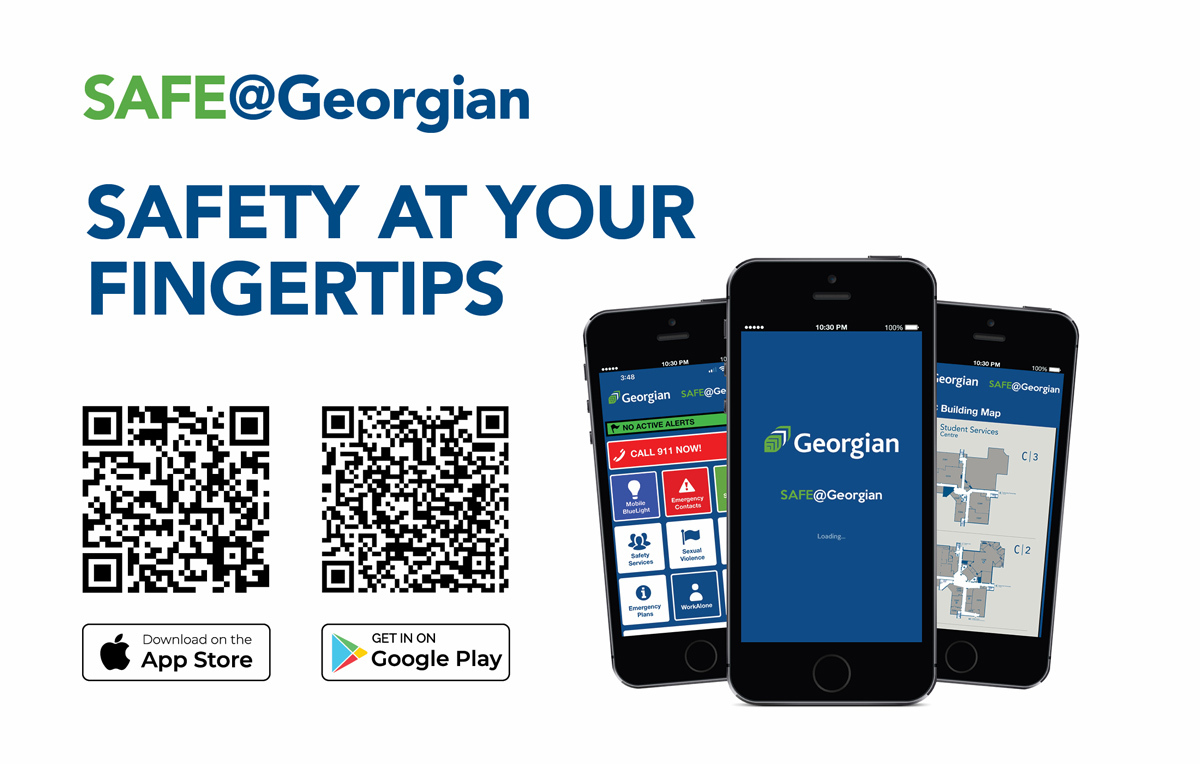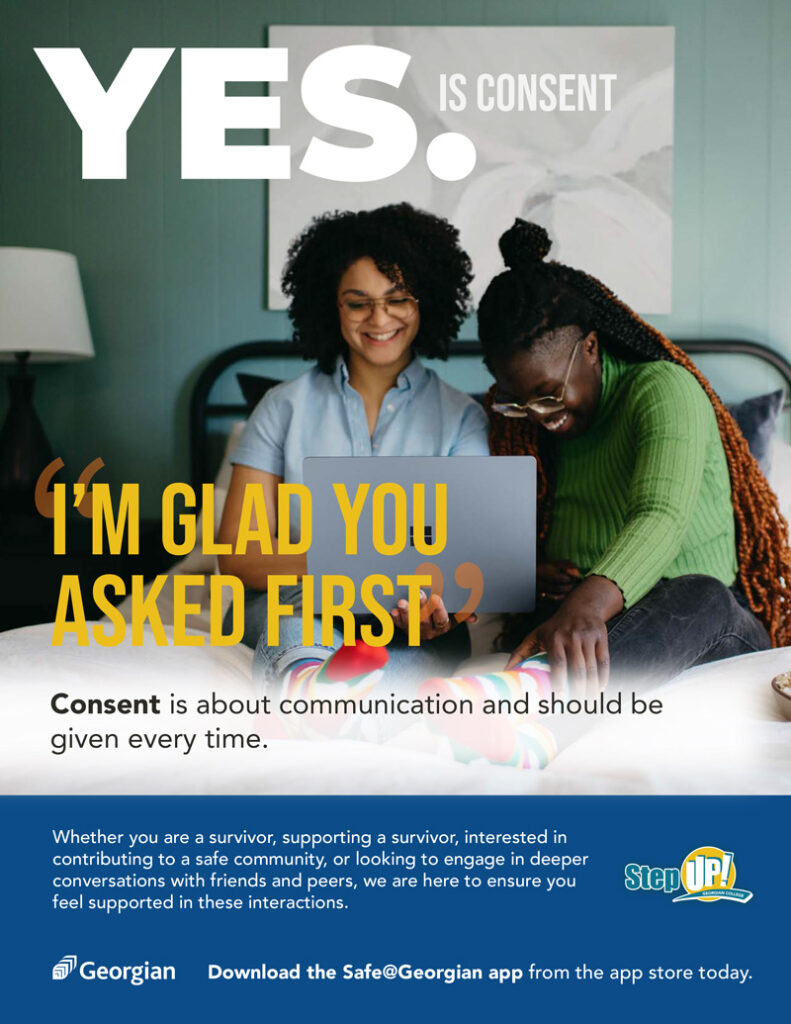Sexual violence
At Georgian, we’re committed to preventing sexual violence and creating a safe, supportive space for survivors. We all have a right to study and work in an environment free from sexual violence. Remember – it’s never okay!
Georgian’s commitments
Georgian is committed to:
- assisting and supporting survivors of sexual violence
- addressing harmful attitudes and behaviours that attribute blame to the survivor
- dispelling myths and misconceptions about sexual violence and consent
- having a process for internal investigations in place
- ensuring the process for investigation and adjudication of complaints is fair
- engaging in public education and prevention initiatives
- educating the college community about sexual violence and how to respond to reports
- promoting a campus culture in which sexual violence isn’t tolerated
A note about confidentiality:
Georgian will respect the confidentiality of all persons involved in a report of sexual violence. That confidentiality will be protected to the greatest extent possible – without compromising the safety of others.
Get support
What to do if you’ve experienced sexual violence
If you’ve experienced sexual violence, we encourage you to:
- go to a safe place
- get medical attention
- seek support and counselling
- report the incident
There are different paths that you can take as a survivor. It’s ultimately YOUR decision and one you should be comfortable with. Options can include:
- getting emergency help (i,e., contacting 911 or your local police services)
- talking to trusted, caring friends or family
- seeking support from professionals (i.e., counsellors and advisors)
- reaching out to community resource providers (i.e., domestic violence or women’s shelters)
- choosing not to disclose your experience or to report the incident

If you decide you’re ready to share your experience with someone at Georgian:
Connecting with support at Georgian can be done in a number of ways.
We’re committed to assisting and supporting survivors in a way that respects you and ensures the safety of all, with and without involving police.
Contacts
If you ‘re a survivor and wish to speak to someone at Georgian, please connect with any of the following:
General
To explore your process options at Georgian:
- Security 24-hour line: 705.722.5100
- Executive Director of Campus Safety Services: 249.388.1925
- Manager of Conflict Resolution and Investigations: 249.388.0290
- Human Resources: 705.722.1580
- Contact your local police
Counselling
For counselling support:
- Counselling Services: 1.877.722.1523
- Good2Talk support line: 1.866.925.5454
- Athena’s Sexual Assault Counselling and Advocacy 24/7 crisis line: South Simcoe – 1.800.987.0799; North Simcoe – 1.800.461.1750
Give support
If a survivor discloses their experience to you:
- Do your best to respond calmly
- Use empathetic listening and express your support
- Listen carefully without offering back any comments that convey your opinions, judgements or perceptions about the incident or their behaviour
- Don’t touch a survivor unless they first touch you. (e.g. hugging); respect that their sense of safety has likely been violated and that this may have caused them to redraw their boundaries when it comes to sharing space or engaging in physical contact
- Show the survivor respect and give them control of the situation by supporting their decision(s) in as many ways possible
- Validate them by making it clear you believe the assault happened and that it’s not their fault
- Be patient; recognize that they’ve experienced trauma and what happens next is up to them
Your role is support the survivor and reconnect them to safety:
- Ask the survivor if they’re safe right now and redirect them to immediate help (e.g. 911, local police or Campus Safety Services) if their answer is anything but yes
- Don’t ask questions about what occurred
- Guide them kindly away from sharing details about what happened by saying early on and clearly that your role is to help them keep safe while they connect with whichever professional advisors they choose
- Prioritize their well-being by offering to connect them with supports such as counselling and/or medical care
- Reiterate that you appreciate their trust and the courage it took to speak to you, and that you believe them
- Your role is that of a connector; connecting them back to people and processes that can help them re-establish a sense of safety
Reporting an incident of sexual violence
Georgian’s Conflict Resolution and Investigations (CRI) team has adopted a survivor-centric, trauma-informed approach to understanding a survivor’s experience, without forcing them to file a police report.
We provide information about reporting processes open to a survivor, safety planning services, and referrals to obtain care and support their well-being.
Where there is a risk to community safety, we’ll share the concerns with the appropriate responding authority. We’ll respect and protect a survivor’s rights to confidentiality, to make an informed choice and in many cases, to decline to pursue reporting options in accords with a survivor’s wishes.
Sexual violence complaints can be made by anyone in the Georgian community. Please immediately report any incidents of sexual violence you witness, have knowledge of, or have reason to believe may have occurred.
You may report the incident to:
- 911 if there’s an immediate risk to safety
- Georgian’s security 24-hour line: 705.722.5100
- Georgian’s executive director of Campus Safety Services: 249.388.1925
- Georgian’s manager of Conflict Resolution and Investigations: 249.388.0290
- Human Resources at Georgian: 705.722.1580
- your local police station
Glossary
Consent is voluntarily and clearly agreeing to engage in sexual activity, and an understandable exchange of affirmative words or conduct that indicates a willingness to participate.
Watch a video to educate yourself on what it means to give and receive consent, and discover more about your personal boundaries.
Sexual violence includes any act – whether physical or psychological in nature – that is committed, threatened or attempted against a person without the person’s consent, and includes sexual assault, sexual harassment, stalking, indecent exposure, voyeurism and sexual exploitation.
A survivor is someone who has experienced a form of sexual violence and is beginning their healing journey post-incident. Rather than adopting the more traditional term victim, used to signify someone’s who been subjected to a criminal act, people who use the term survivor may be doing so because it’s a term of empowerment which emphasizes the person over the act that disrupted their sense of security and self-determination. It’s a person’s choice to determine whether they identify as a survivor, a victim or both. Your acceptance of their language is a practical way to demonstrate empathy and provide support.
Survivors have a right to be believed, treated with respect, informed, protected, heard and supported.
Being survivor-centric means prioritizing the rights, needs and expressed wishes of a survivor. It means treating a survivor as an individual person and doing whatever you can do to create a supportive environment around them so that they feel respected, empowered to exercise their rights and able to seek support.
Frequently asked questions (FAQs)
Review Georgian’s Sexual Violence Policy (PDF).
Alternate formats are available by emailing conflictresolution@georgiancollege.ca.
Review Georgian’s Sexual Violence Procedure (PDF).
Alternate formats are available by emailing conflictresolution@georgiancollege.ca.
All disclosures related to an experience of a community member involving sexual violence will be responded to in a caring and supportive manner by CRI in harmony with our Sexual Violence Procedure.
CRI has adopted a survivor-centric, trauma-informed approach to understanding a survivor’s experience and does not force a survivor to make a report to police or engage in a college investigation. We provide information about reporting processes open to a survivor, safety planning services and referrals to obtain care and support their well-being.
If you’re a student and have received a disclosure from someone at Georgian telling you they’ve experienced sexual violence, please connect the survivor with support right away. Provide an empathetic ear and focus on helping them re-connect to their sense of safety:
- Ask them, “What can I do to help you get safe and keep safe right now?”
- Suggest, “May I connect you with support from either counselling or an advisor in Conflict Resolution and Investigations?”
- Follow up by speaking with a counsellor or CRI on your own to ensure that your peer was connected to support
All employees must take action to support a survivor who has disclosed by connecting them with support through Counselling Services (students), Human Resources (employees) or Campus Safety Services (any college survivor). These departments will ensure the survivor is informed of their options and connected to supports.
Please refer to our Sexual Violence Procedure to learn more. If you’re uncertain how best to connect a survivor, please contact us for advice.
Safe@Georgian app
Keep us in your pocket! The Safe@Georgian mobile app provides quick and easy access to emergency contacts, support resources and much more.
App features
- One touch connection to local police, campus security, safety escort request line, conflict resolution, and mental health and well-being supports
- Mobile Blue Light will send a ping with your location to security and provide your phone number so they can contact you when you are not feeling safe
- Campus maps
- Important notifications (e.g., lockdown, fire, unscheduled campus closures, etc.)
- Sexual violence resources and information
- Report suspicious activity

Contact us
Have a general question about sexual violence at Georgian?
Please email us at conflictresolution@georgiancollege.ca.
For further information, you can contact:


April Nietzschmann
Conflict Resolution Coordinator
Conflict Resolution and Investigations
Phone: 249.388.0322
Email: Email April

Rebecca Pappas
Conflict Resolution and Investigations Administrator
Conflict Resolution and Investigations
Phone: 249.388.0354
Email: Email Rebecca

Meghan MacDonald
Conflict Resolution Coordinator
Conflict Resolution and Investigations
Phone: 249.388.2352
Email: Email Meghan

